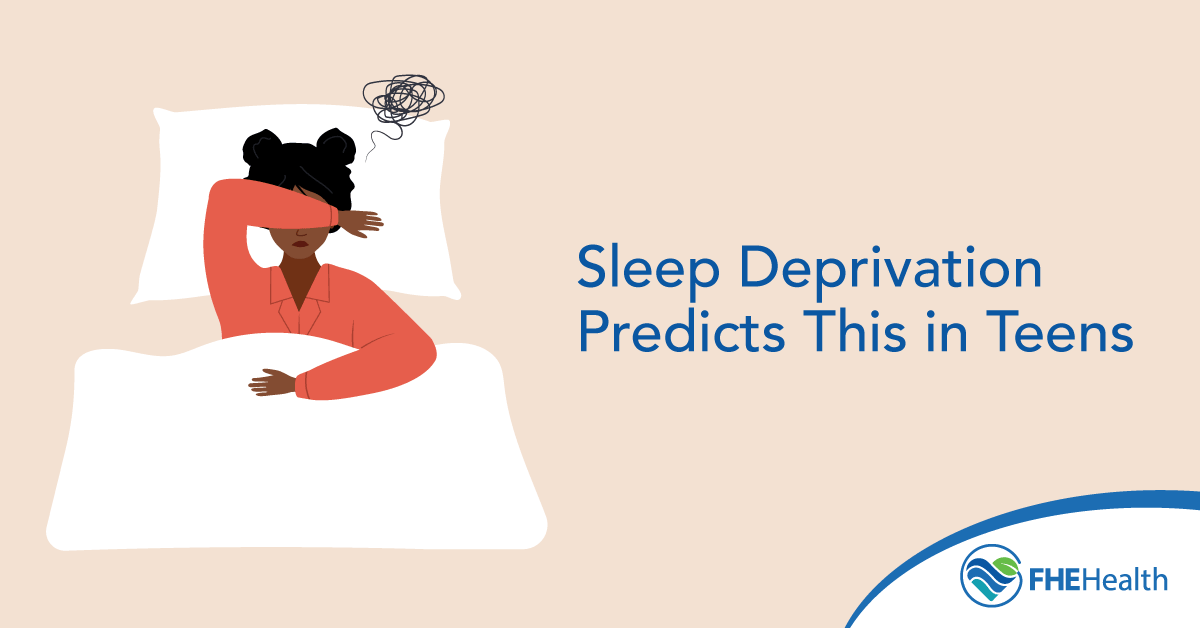
Sleep provides multiple benefits for the brain and body, allowing for improved cognitive functioning, enhanced moods and better mental and physical health regardless of age. Sleep also helps the body repair itself and fight off a wide range of illnesses while strengthening the ability to make better choices. As a result, a direct correlation exists between sleep deprivation and substance abuse.
For teens, sleep plays a prominent role in development because young adults experience higher rates of physical, mental and emotional growth. However, stress due to grades, extracurricular activities, peer pressure and daily life can disrupt normal sleep patterns. This often puts teens at a direct risk of engaging in damaging behaviors, including substance abuse. Continue reading to explore the relationship between addiction and sleep deprivation and learn how parents can spot issues and correct them.
Linking Sleep Deprivation and Substance Abuse
Studies have shown that approximately 70% of all teens fail to get enough sleep each night, whether they’re on the phone with friends, playing video games until late hours or taking care of home responsibilities. Teens who don’t get enough sleep each night are at higher risk of physical and mental health problems, including high blood pressure from obesity, diabetes, heart attack and depression. Poor sleep habits can also result in low self-esteem, diminished academic performance and an inability to concentrate. Drug and alcohol abuse often masks insecurities and makes teenagers feel more confident and happier, so they tend to use at parties and other events to fit in and feel connected.
Not only can insufficient sleep lead to substance abuse, but those who struggle with addiction may also have an increased risk of sleep disturbances. Drugs such as cocaine, nicotine and caffeine are stimulants that make the user feel wide awake, which means they may have trouble going to sleep and staying asleep. The result is bidirectional. Individuals who struggle to stay awake in the morning may take more of these substances to get through the day, resulting in a continuous cycle.
Importance of Monitoring and Improving Sleep Habits
Because of the connection between sleep deprivation and substance use, parents need to pay attention to their teenagers’ sleep habits. Healthy sleep habits are the foundation of a teenager’s emotional and physical well-being, so making sure a teen gets enough sleep can significantly reduce the chance of drug and alcohol addiction.
Some signs of poor sleep may be more obvious than others, including being cranky or moody first thing in the morning or being irritable throughout the day. Parents may also notice that their teenager seems sad or anxious or may even lash out at family members, having a difficult time controlling their anger or emotions. Other common signs of too little sleep include:
- Having difficulty concentrating or constant daydreaming
- Falling asleep while watching TV or reading
- Oversleeping on the weekends
- Taking frequent naps in the afternoon or after school
- Having trouble waking up in the morning
- Performing poorly in school
Poor sleep habits can be a normal part of growing up, but sleep deprivation isn’t. The habits developed during adolescence often carry over into adulthood, so it’s important to establish the importance of getting a good night’s rest.
Preventive Measures for Parents and Caregivers
While it’s not uncommon for teenagers to consider themselves night owls, their parents must help them establish healthy sleep habits. Reducing the risks of sleep deprivation and substance abuse requires a proactive approach. Following are some ways to help your teen get enough sleep each night.
- Establish a bedtime routine. It may be difficult to get older teens to commit to lights out or a specific bedtime, but it’s possible to encourage a consistent daily routine for younger teenagers. Plan a daily schedule that allows regular times for homework, chores, extracurricular activities and relaxation. Post the schedule in a location that’s convenient for all to see, or use a mobile app, such as Google Calendar, to set reminders. When teens have a planned structure for their day, they’re less likely to stay up late or participate in unhealthy behaviors.
- Eliminate caffeine and other stimulants. Some of the most popular beverages among teens are soft drinks, energy drinks and coffee. Too much caffeine at any time of the day can produce excessive energy, increase alertness and disrupt sleep, and the effects last sometimes 5 hours or longer. To avoid sleep problems, discourage caffeine consumption after lunch.
- Exercise during the day. Staying active during the day is an excellent way to ensure good sleep at night. Children aged 6 to 17 should get at least 60 minutes of exercise daily. Encourage your teen to get outside in the sunshine, resetting the body’s natural circadian rhythms and promoting better sleep. Go for a walk together after dinner, join a gym or make physical activity a part of a daily routine.
- Create a comfortable environment. A few simple updates to your child’s bedroom can help create an atmosphere for better sleep. Keep the bedroom light level as low as possible. Use a fan to create white noise, and use essential oils, such as lavender, that promote relaxation.
- Avoid electronics before bed. Ban all electronics at least an hour before bed. Exposure to light from a telephone, TV and other electronics can increase the time it takes to fall asleep. Even normal indoor light levels can affect the way your body produces melatonin, which regulates your night and day cycles.
- Consult your physician. If you’ve tried everything and your teen still struggles with sleep, it may be time to seek professional help. Poor sleep could be a sign of mental health issues, such as stress, anxiety and depression.
Reaching Out for Help
If you or someone you love struggles with sleep deprivation and substance abuse, it’s time to seek help. Contact FHE Health today to explore your options and speak to one of our caring counselors.







